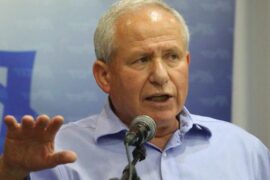Prime Minister Binyamin Netanyahu (Likud) made an about-face Tuesday morning, announcing that he was canceling the agreement he announced less than 24 hours earlier regarding African migrants in Israel.
Netanyahu’s announcement late Monday had prompted a major backlash from coalition partners and activists calling for the removal of the asylum seekers.
Netanyahu’s announcement came at the beginning of a meeting in his office with residents of south Tel Aviv opposed to the plan that would allow some 16,000 of the African migrants to remain in Israel – mostly in their neighborhoods – while another roughly 16,000 would, under an agreement reached with the United Nations High Commission on Refugees, be absorbed by Western nations.
Netanyahu said that in the past 24 hours he has consulted with Interior Minister Aryeh Deri (Shas) – who spoke alongside him on Monday at the Prime Minister’s Office announcing the plan – as well as with professionals dealing with the issue and representatives of the residents of south Tel Aviv.
After listening to the many reservations from government ministers over the agreement, Netanyahu said he had decided to cancel the plan.
The cancelation illustrates the extent to which demographic shifts in Israel have strengthened the nation’s more tribalist sectors. From a narrow nationalist perspective, the African migrants are considered a threat to the country’s Jewish character.
These feelings are especially strong amongst the impoverished Jewish residents of south Tel Aviv who see the asylum seekers as competing with them for jobs and drastically changing the character of their neighborhoods and schools.
The now canceled deal had sparked hope among asylum seekers and their supporters, replacing a plan that would have likely sent them en mass to Rwanda and Uganda.
The one decision announced at the Monday press conference that will remain, Netanyahu said, is the decision to establish a rehabilitation administration for south Tel Aviv.





